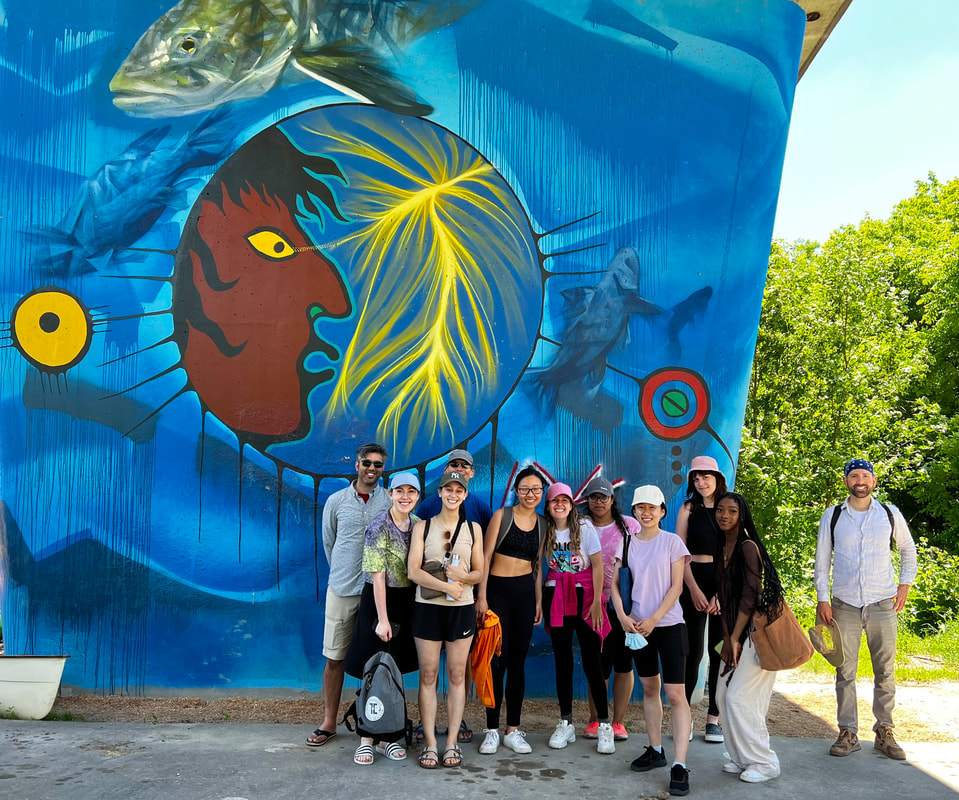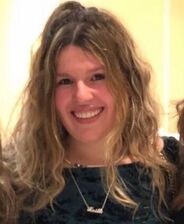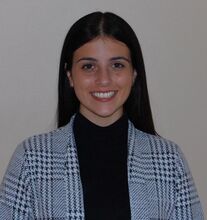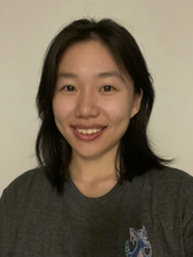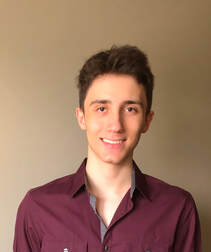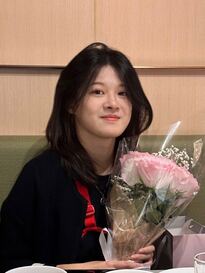Principal Investigator
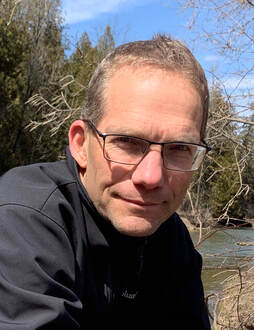
Asaf Gilboa, Ph.D.
I completed my undergraduate studies at the Hebrew University in Jerusalem, majoring in Psychology and the Amirim inter-disciplinary program. I received my M.A. degree in Clinical Neuropsychology from the Hebrew University in Jerusalem where I studied the neurocognitive effects of Posttraumatic Stress Disorder (PTSD) and Traumatic Brain Injury (TBI). I received my Ph.D. in Psychology and Neuroscience from the University of Toronto, where I studied the cognitive neuroscience of remote memory. I then pursued postdoctoral studies at the Rotman Research Institute in Toronto focusing on prefrontal contributions to memory monitoring and control. I was a Lecturer and Senior Lecturer at Haifa University in Israel where I also served as co-director of the Clinical Neuropsychology program. I am currently a Senior Scientist at the Rotman Research Institute at Baycrest as well as an Associate Professor in Psychology at the University of Toronto and Affiliate Scientist at the Toronto Rehabilitation Institute. Together with my lab members I investigate neurological and neuropsychiatric aspects of memory disorders. Our research focuses on memory disorders such as amnesia, dementia and confabulation, employing various methodologies (lesion analysis, fMRI, Skin conductance, ERP and MEG) to investigate of the mechanisms underlying these disorders. I have co-authored over 50 articles and book chapters, and have received several awards including the Dusty and Ettie Miller Fellowship for Outstanding Young Scholars and the Donald T. Stuss Award for Research Excellence.
I completed my undergraduate studies at the Hebrew University in Jerusalem, majoring in Psychology and the Amirim inter-disciplinary program. I received my M.A. degree in Clinical Neuropsychology from the Hebrew University in Jerusalem where I studied the neurocognitive effects of Posttraumatic Stress Disorder (PTSD) and Traumatic Brain Injury (TBI). I received my Ph.D. in Psychology and Neuroscience from the University of Toronto, where I studied the cognitive neuroscience of remote memory. I then pursued postdoctoral studies at the Rotman Research Institute in Toronto focusing on prefrontal contributions to memory monitoring and control. I was a Lecturer and Senior Lecturer at Haifa University in Israel where I also served as co-director of the Clinical Neuropsychology program. I am currently a Senior Scientist at the Rotman Research Institute at Baycrest as well as an Associate Professor in Psychology at the University of Toronto and Affiliate Scientist at the Toronto Rehabilitation Institute. Together with my lab members I investigate neurological and neuropsychiatric aspects of memory disorders. Our research focuses on memory disorders such as amnesia, dementia and confabulation, employing various methodologies (lesion analysis, fMRI, Skin conductance, ERP and MEG) to investigate of the mechanisms underlying these disorders. I have co-authored over 50 articles and book chapters, and have received several awards including the Dusty and Ettie Miller Fellowship for Outstanding Young Scholars and the Donald T. Stuss Award for Research Excellence.
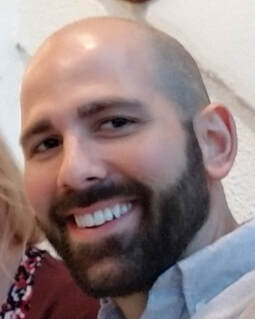
Post-Docs
Erik Wing, Ph.D.
I moved to Toronto to do postdoctoral research with Asaf Gilboa and Jennifer Ryan after completing my PhD in cognitive neuroscience at Duke University, where I worked with Roberto Cabeza. My doctoral research explored the relationship between initial memory formation and subsequent retrieval, including how initial sensory representations are recapitulated in the brain during recollection. One recurring theme in this work, and in the field more broadly, is that memories are not faithful reproductions of past experience but are instead shaped by numerous factors that can cause certain content to be differentially prioritized, distorted, or schematized. From the very outset, information that makes its way into memory is influenced by our expectations, biases, and correspondence to prior knowledge. My current research focuses on how having organized knowledge about a particular domain (anything from art history to cars) influences learning and memory for related material. This process is familiar to anyone who initially struggles to learn unfamiliar information but finds that subsequent learning is easier once new material can be integrated into an emerging knowledge framework. With respect to brain function, I am interested in exploring how the acquisition of visosemantic expertise leads to schematic reshaping of related neural representations, with corresponding consequences for different forms of memory.
Erik Wing, Ph.D.
I moved to Toronto to do postdoctoral research with Asaf Gilboa and Jennifer Ryan after completing my PhD in cognitive neuroscience at Duke University, where I worked with Roberto Cabeza. My doctoral research explored the relationship between initial memory formation and subsequent retrieval, including how initial sensory representations are recapitulated in the brain during recollection. One recurring theme in this work, and in the field more broadly, is that memories are not faithful reproductions of past experience but are instead shaped by numerous factors that can cause certain content to be differentially prioritized, distorted, or schematized. From the very outset, information that makes its way into memory is influenced by our expectations, biases, and correspondence to prior knowledge. My current research focuses on how having organized knowledge about a particular domain (anything from art history to cars) influences learning and memory for related material. This process is familiar to anyone who initially struggles to learn unfamiliar information but finds that subsequent learning is easier once new material can be integrated into an emerging knowledge framework. With respect to brain function, I am interested in exploring how the acquisition of visosemantic expertise leads to schematic reshaping of related neural representations, with corresponding consequences for different forms of memory.
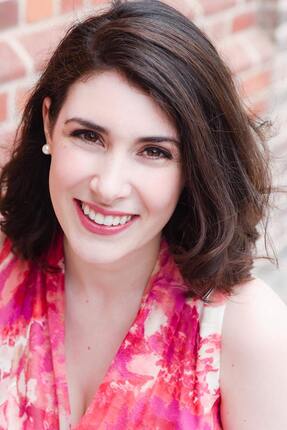
Hannah Tarder-Stoll, Ph.D.
Memories are not simply for reflecting on the past, but can also be used to guide behaviour in our daily lives. We can draw on our past experiences to make predictions about future events, determine where to allocate our attention, or make optimal decisions. My research seeks to understand how memories are flexibly encoded, represented, and retrieved to guide such adaptive behaviour. In my doctoral research at Columbia University, where I worked with Mariam Aly and Chris Baldassano, I investigated how memory for temporal structure is flexibly and durably represented in memory and in the brain to make predictions about future events along multiple timescales. In my postdoctoral fellowship with Asaf Gilboa and Morris Moscovitch, I aim to further our understanding of the adaptive uses of memory by characterizing how memories at different levels of granularity are flexibly used to guide attention through the instantiation of predictions, and how attention shapes memories at different levels of granularity. My ultimate goal is to uncover how the brain’s memory systems flexibly interact with other facets of cognition to guide adaptive behaviour in complex environments.
Memories are not simply for reflecting on the past, but can also be used to guide behaviour in our daily lives. We can draw on our past experiences to make predictions about future events, determine where to allocate our attention, or make optimal decisions. My research seeks to understand how memories are flexibly encoded, represented, and retrieved to guide such adaptive behaviour. In my doctoral research at Columbia University, where I worked with Mariam Aly and Chris Baldassano, I investigated how memory for temporal structure is flexibly and durably represented in memory and in the brain to make predictions about future events along multiple timescales. In my postdoctoral fellowship with Asaf Gilboa and Morris Moscovitch, I aim to further our understanding of the adaptive uses of memory by characterizing how memories at different levels of granularity are flexibly used to guide attention through the instantiation of predictions, and how attention shapes memories at different levels of granularity. My ultimate goal is to uncover how the brain’s memory systems flexibly interact with other facets of cognition to guide adaptive behaviour in complex environments.
Graduate Students
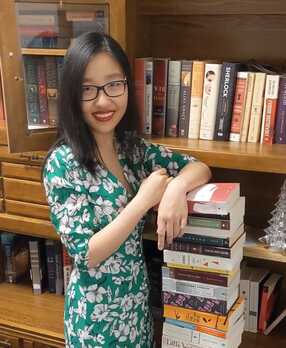
Victoria (Tong) Liu, B.A.
I received my bachelor degree in Neuroscience and Cognitive Science from the University of Toronto. Throughout my undergraduate years, I received a wide range of training from computational neuroscience to social cognitive neuroscience. My interdiscinplary experience collectively contributed to my current research interest as a graduate student of the lab, which is to computationally model the semantic and episodic memory networks. I am currently working on a project to map out the temporal evolution of cortical semantic networks during incidental learning. The photo was taken in December 2020, in front of my bookcase with all the books I read in 2020!
I received my bachelor degree in Neuroscience and Cognitive Science from the University of Toronto. Throughout my undergraduate years, I received a wide range of training from computational neuroscience to social cognitive neuroscience. My interdiscinplary experience collectively contributed to my current research interest as a graduate student of the lab, which is to computationally model the semantic and episodic memory networks. I am currently working on a project to map out the temporal evolution of cortical semantic networks during incidental learning. The photo was taken in December 2020, in front of my bookcase with all the books I read in 2020!
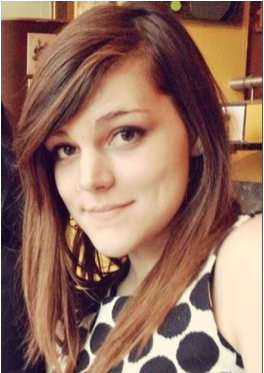
Hannah Marlatte, M.A.
I am interested in understanding how our past experiences shape how we perceive and remember the present. During my MA, I developed a model of learning based on principles of Bayesian statistics. This noted different learning styles that vary in next-day memory performance based on one’s use of relevant prior knowledge.
For my PhD, I am trying to understand how trauma impacts what people encode and remember in scene-based memories. It’s been noted that folks with PTSD have fragmented memories, where individual items in a scene can be recalled but not necessarily their relationships with each other. I want to examine how the oculomotor system could help support (re)-consolidation processes of these item relationships by influencing oscillatory dynamics. Outside of research, I like to crochet, cook, go for walks, and (attempt to) cuddle my cat.
I am interested in understanding how our past experiences shape how we perceive and remember the present. During my MA, I developed a model of learning based on principles of Bayesian statistics. This noted different learning styles that vary in next-day memory performance based on one’s use of relevant prior knowledge.
For my PhD, I am trying to understand how trauma impacts what people encode and remember in scene-based memories. It’s been noted that folks with PTSD have fragmented memories, where individual items in a scene can be recalled but not necessarily their relationships with each other. I want to examine how the oculomotor system could help support (re)-consolidation processes of these item relationships by influencing oscillatory dynamics. Outside of research, I like to crochet, cook, go for walks, and (attempt to) cuddle my cat.
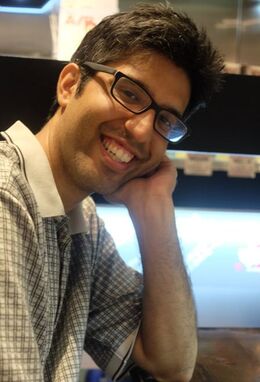
Prateek Dhamija, M.Sc.
My interest in neuroscience comes from a background in biology and behavioral neuroscience. I first became involved in neuroscience in my third year at Queen's university where I conducted electrophysiological field recordings in the hippocampus. From there, I became interested in all areas of neuroscience research, but in particular: how behaviours are adaptive and are shaped by their context.
For my undergraduate and masters theses' at Queen's University, this theme resonated throughout my work as I investigated the effects of stress during adolescence on the emergence of maladaptive adult emotive behaviours related to anxiety, depression, and aggression with Dr. Janet Menard. Throughout my research, I developed a deeper interest in framing behaviour in terms of how adaptive it is for a given context. Questions of interest include: What kind of environment leads to certain behaviours becoming maladaptive compared to others? What factors accelerate or prevent the development of maladaptive behaviours? Can maladaptive behaviours become adaptive ones in different contexts?
For my PhD, I have been interested in applying these ideas to develop translational models of research for how we learn associations between our behaviour and stimuli in our environment. In particular, I hope to examine these questions with regards to higher order Pavlovian conditioning. Outside of academia, I enjoy team sports as well as traveling, hiking and photography.
My interest in neuroscience comes from a background in biology and behavioral neuroscience. I first became involved in neuroscience in my third year at Queen's university where I conducted electrophysiological field recordings in the hippocampus. From there, I became interested in all areas of neuroscience research, but in particular: how behaviours are adaptive and are shaped by their context.
For my undergraduate and masters theses' at Queen's University, this theme resonated throughout my work as I investigated the effects of stress during adolescence on the emergence of maladaptive adult emotive behaviours related to anxiety, depression, and aggression with Dr. Janet Menard. Throughout my research, I developed a deeper interest in framing behaviour in terms of how adaptive it is for a given context. Questions of interest include: What kind of environment leads to certain behaviours becoming maladaptive compared to others? What factors accelerate or prevent the development of maladaptive behaviours? Can maladaptive behaviours become adaptive ones in different contexts?
For my PhD, I have been interested in applying these ideas to develop translational models of research for how we learn associations between our behaviour and stimuli in our environment. In particular, I hope to examine these questions with regards to higher order Pavlovian conditioning. Outside of academia, I enjoy team sports as well as traveling, hiking and photography.

Ariana Giuliano, M.A.
I have always been curious about the complex underpinnings of memory and cognition. Having completed my Bachelor of Arts in Psychology at McGill University, I became thoroughly interested in the research of Brenda Milner and her work with patient H.M., which fuelled my interest in the neuropsychological facets of memory. Memories represent the fundamentals for how we conceive of ourselves, others, and everything in our environment. I believe that researching how memory disorders impact functioning is key in understanding how memory is represented on multiple levels in the brain such as cellular, circuitry, and systems levels. My previous undergraduate research involved investigating the behavioural implications of pain in both mice and humans in addition to some clinical research on spinal cord injury. For my Masters thesis I am interested in the neural oscillations underlying schema instantiation and perception and how damage to the ventromedial prefrontal cortex may impair both neural schema representations and schema instantiation and interpretation. Outside of the lab I am an avid rock-climber, yogi, dancer, hiker, and dog mom.
I have always been curious about the complex underpinnings of memory and cognition. Having completed my Bachelor of Arts in Psychology at McGill University, I became thoroughly interested in the research of Brenda Milner and her work with patient H.M., which fuelled my interest in the neuropsychological facets of memory. Memories represent the fundamentals for how we conceive of ourselves, others, and everything in our environment. I believe that researching how memory disorders impact functioning is key in understanding how memory is represented on multiple levels in the brain such as cellular, circuitry, and systems levels. My previous undergraduate research involved investigating the behavioural implications of pain in both mice and humans in addition to some clinical research on spinal cord injury. For my Masters thesis I am interested in the neural oscillations underlying schema instantiation and perception and how damage to the ventromedial prefrontal cortex may impair both neural schema representations and schema instantiation and interpretation. Outside of the lab I am an avid rock-climber, yogi, dancer, hiker, and dog mom.

Adina Levi, B.Sc., M.A.
I began my undergraduate degree studying biology at York University. Early on in my studies, I was introduced to the fascinating interface between biology and psychology, and the notion that human behaviour can be explained by neural underpinnings. This motivated me to study cognitive neuroscience, and I enrolled in a Specialized Honours Bachelors of Science in Psychology degree.
I started volunteering at the Gilboa Lab in 2016 and contributed to the lab by developing stimuli for a cognitive neurointervention study aiming to offset chronic hippocampal degeneration in traumatic brain injury patients. I completed my undergraduate thesis under the supervision of Dr. Gilboa and Dr. Gary Turner at York University and examined the relationship between hippocampal-dependent abilities: spatial navigation and pattern completion and separation.
I am currently an MA student at York University's Clinical Neuropsychology program. My MA thesis aims to study the similarities and differences in rest and reactivation memory tasks in medial temporal lobe and ventromedial prefrontal cortex patients. Outside of the lab, I love to travel, hike and paint.
I began my undergraduate degree studying biology at York University. Early on in my studies, I was introduced to the fascinating interface between biology and psychology, and the notion that human behaviour can be explained by neural underpinnings. This motivated me to study cognitive neuroscience, and I enrolled in a Specialized Honours Bachelors of Science in Psychology degree.
I started volunteering at the Gilboa Lab in 2016 and contributed to the lab by developing stimuli for a cognitive neurointervention study aiming to offset chronic hippocampal degeneration in traumatic brain injury patients. I completed my undergraduate thesis under the supervision of Dr. Gilboa and Dr. Gary Turner at York University and examined the relationship between hippocampal-dependent abilities: spatial navigation and pattern completion and separation.
I am currently an MA student at York University's Clinical Neuropsychology program. My MA thesis aims to study the similarities and differences in rest and reactivation memory tasks in medial temporal lobe and ventromedial prefrontal cortex patients. Outside of the lab, I love to travel, hike and paint.
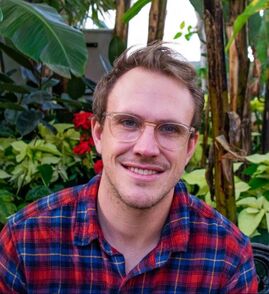
Benjamin Alsbyry-Nealy, B.Sc., M.A
Virtual reality, augmented reality and artificial intelligence are revolutionizing the way we interact with the world around us and provide exciting new ways to study human behaviour. My research leverages these emerging technologies to investigate how we learn and form memories while navigating real world environments.
Before joining the Gilboa lab, I received my BSc in Psychology, Economics and Mathematics from the University of Toronto. Subsequently I earned my M.A. in Psychology at eh University of Toronto, under the direction of Katherine Duncan, where I developed virtual environment tasks analogous to tasks performed by mice, enabling robust comparative analyses. These efforts also resulted in an open-source toolbox - OpenMaze - that enables researchers to quickly create 3D environment tasks. If I'm not in the lab, you can find me training for my next triathlon, or hiking the Ontario wilderness.
Virtual reality, augmented reality and artificial intelligence are revolutionizing the way we interact with the world around us and provide exciting new ways to study human behaviour. My research leverages these emerging technologies to investigate how we learn and form memories while navigating real world environments.
Before joining the Gilboa lab, I received my BSc in Psychology, Economics and Mathematics from the University of Toronto. Subsequently I earned my M.A. in Psychology at eh University of Toronto, under the direction of Katherine Duncan, where I developed virtual environment tasks analogous to tasks performed by mice, enabling robust comparative analyses. These efforts also resulted in an open-source toolbox - OpenMaze - that enables researchers to quickly create 3D environment tasks. If I'm not in the lab, you can find me training for my next triathlon, or hiking the Ontario wilderness.
Undergraduate Students and Volunteer RA's
Annie Mandatori
Jingran Peng
Helen Musulan
Ramsha Mahmood
Alla Spinu
Jingran Peng
Helen Musulan
Ramsha Mahmood
Alla Spinu
Alumni
Postdoctoral fellows:
Eve Attali Neuropsychologist, CEMEREM la Timone Hospital, Marseille
Vessela Stamenova Research Lead, implementation and evaluation of virtual healthcare, Women's College Hospital, Toronto
PhD alumni:
Zorry Belchev Policy Analyst, Community Care Support Services, Ministry of Health, Government of British Columbia
Melissa Hebscher Postdoctoral fellow at Northwestern University
Maayan Merhav Postdoctoral fellow at German Center for Neurodegenerative Diseases (DZNE), Magdeburg
Tali Atir Lecturer at Emek Yezreel College and clinical psychologist at Tamuz Institute, Haifa
Shani Waidergoren Clinical Neuropsychologist, private practice
Eve Attali Neuropsychologist, CEMEREM la Timone Hospital, Marseille
Vessela Stamenova Research Lead, implementation and evaluation of virtual healthcare, Women's College Hospital, Toronto
PhD alumni:
Zorry Belchev Policy Analyst, Community Care Support Services, Ministry of Health, Government of British Columbia
Melissa Hebscher Postdoctoral fellow at Northwestern University
Maayan Merhav Postdoctoral fellow at German Center for Neurodegenerative Diseases (DZNE), Magdeburg
Tali Atir Lecturer at Emek Yezreel College and clinical psychologist at Tamuz Institute, Haifa
Shani Waidergoren Clinical Neuropsychologist, private practice
|
MA alumni:
Grace Gabriel Vanessa Ghosh Shelly Ben Israel Moran Barkan Tehila Guigui Adi Zakay Sarah Adler-Luzon Neta Kvetniy-Ferdman |
Neta Levy Lina Abo-Ahmad Rinat Bar-Eliezer Osnat Mussel Hila Sholomon Roman Rozengrut Judith Segalovicz Raneen Nicola |
|
Undergraduate thesis alumni:
Victoria Harding Pratyush Menon Shuran (Rayna) Tang Rachel Hickson Madison Fraser Adam Pugsley Lai Wong Shaylyn Joseph Anastasia Kalantarova Saambavy Shan Richard Wang Osnat Peleg Hila Levinzon Itamar Behrman Osnat Harari Maayan Blitz |
Undergraduate students, RA's and volunteer alumni:
Jen Siegel Leanne Mendoza Christina Lubinsky Shaheem Alam Niels Erik Nandal Alita Fernandez Kyle Nealy Mubina Butt Brahm Sanger Shaily Oisie Samreen Aziz Mamta Kapoor Karen Joseph (KL-CARE) Simran Rehal Vaishaalie Nimalan Shreeyaa Ramana |
Sharon Chernyak Laxan Premachandran George He Christine Ibrahim Julia Kearly Xinyi (Lisa) Chen Talha Anwar Chaudhry Noa El-Hassid Dana Silberberg Ory Bar-Haim Alina Nikiforov Inbal Goldfrecht Isha Dua Kelly Liu Nazanin Babaei |
